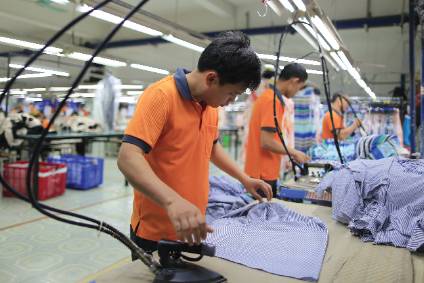
Progress has been made in improving working conditions and labour rights in Vietnam’s textile and apparel sector, but challenges remain – including inadequate fire systems and limited access to medical facilities.
Vietnam’s garment and textile industry generated US$39bn in export revenues in 2019, making the sector is one of the largest generators of export revenue for the country, at around 16% of total exports. It employs around 2.8m people, of whom 80% are women.
However, according to the latest annual report from the International Labour Organization’s (ILO) Better Work Vietnam programme, many clothing factories face serious challenges due to the Covid-19 pandemic, given their dependence on imported materials and accessories (primarily from China and Korea) and export markets (mainly to the US and the EU).
If the virus cannot be contained, leading to falling demand, Better Work encourages dialogue and labour compliance for long and short-term development goals.
In 2019, Better Work collaborated with the ILO Vietnam office to support the government in the development of a new Labour Code. The fifth and latest version of the code for the first time lets workers form or join a representative organisation of their own choosing.
“This [the adoption of Labour Code, 2019] is a significant step as it will substantially improve Vietnam’s employment and industrial relations, and create a solid foundation for fair, international integration and trade,” says Chang-Hee Lee, ILO country director for Vietnam.

US Tariffs are shifting - will you react or anticipate?
Don’t let policy changes catch you off guard. Stay proactive with real-time data and expert analysis.
By GlobalDataOther achievements last year included a 20 percentage point decline in non-compliance on having a properly functioning unit in charge of Occupational Safety and Health (OSH) and/or an OSH Council among the 62 factories that have been with Better Work Vietnam for more than eight years.
Non-compliance on accurate payrolls also dropped 29 percentage points after eight years (cycles) with Better Work Vietnam. The organisation also recorded a 22 percentage points decrease in non-compliance on union consultation among Better Work’s 62 factories.
However, challenges remain. 78% of all the participant factories were non-compliant with monthly limits of overtime worked, and 74% were non-compliant with annual limits. Excessive overtime continued to be a challenge in those that were assessed.
Meanwhile, 50% of the assessed factories did not have sufficient onsite medical facilities and staff. One critical aspect of the assessment is the presence of at least one doctor for factories with more than 300 workers, including during overtime hours.
And 31% of assessed workplaces did not have a functioning fire detection and alarm system. In order to bring non-compliance rates down further, Better Work says factories will need to implement more frequent and thorough checks and maintenance to ensure continuous functionality.
The next phase of Better Work Vietnam’s strategic vision (2017-2022) aims to build on its impact, with the following objectives:
- Improved working conditions and business competitiveness in participating factories, with a larger Better Work footprint and impact throughout the industry.
- Expanded commitments by brand buyers, vendors and supply chain intermediaries to the Better Work model and approach, with business practices that support improved compliance and enterprise sustainability across their supply chains.
- Enhanced capacity of national institutions to promote and implement the Better Work model, and institutionalise lessons and best practices in national policy making.
Click here to view the full report.




